|
|
|
Sort Order |
|
|
|
Items / Page
|
|
|
|
|
|
|
| Srl | Item |
| 1 |
ID:
188943
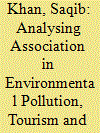

|
|
|
|
|
| Summary/Abstract |
Clean and green environment along with sustainable development is the prime objective of every state. We explore empirically the nexus between tourism, environmental pollution measured by carbon (CO2) emissions, population, trade, foreign direct investment (FDI) and economic growth in six countries from the Commonwealth of Independent States over 1995–2018. Traditional panel estimation technique is employed, where the Hausman test suggests fixed-effects over random effect estimator. We also employed the robust least squares (RLS) estimator to confirm the empirical estimates. Results show that a 1% increase in CO2 will attenuate the economic growth by 0.14% and that 1% raise in the tourism activities can boost growth by 0.04%. Both the fixed-effect and RLS estimates reveal that tourism, population growth and trade contribute significantly to economic growth, whereas CO2 adversely affect growth. The Granger causality test shows a two-way causality between economic growth and CO2 and between growth and trade. Empirical results also indicate a one-way causality between growth and FDI, population and FDI, population and CO2 along with population growth and tourism. These findings suggest that adopting effective policies that can expand trade, enhance FDI and promote the tourism sector with minimum environmental damage will ultimately accelerate sustainable economic development.
|
|
|
|
|
|
|
|
|
|
|
|
|
|
|
|
| 2 |
ID:
188944
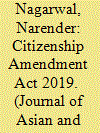

|
|
|
|
|
| Summary/Abstract |
The primary endeavor of this paper is to illuminate the contentious Citizenship Amendment Act 2019 through the constitution and human rights jurisprudence perspective. In this paper, an attempt has been made to propose a different interpretation of the Citizenship Amendment Act 2019 which not only infracts constitutional values but also legalized the hate against minorities, especially Muslims. India—as a nation state—has always cherished and remained concerned about its secular and democratic character. Since independence, India has maintained its global position as a responsible and humane society to protect minorities’ rights and social justice. Shockingly, the legislative development that had taken place in the recent past has questioned India’s commitment toward the certain principle of human rights, democratic values, and secularism which are the hallmark of the Constitution of India. The Citizenship Amendment Act 2019 has put religion as a pre-requisite qualification if someone is desirous to apply for Indian citizenship which is purely a violation of the basic ethos of the constitution. The idea of India as envisioned by the framers of the Indian constitution as a democratic, secular, and socialist state and anything that contrary to its basic structure is unconstitutional. The contentious legislation whether unconstitutional or not needs to be examined through the prism of constitutional law and fundamental norms of human rights. In this research exercise, a modest attempt is made to examine all merits and demerits of this antagonistic citizenship legislation. Throughout the paper, the effort has been given to sustain the notion that India cannot be a republic founded on discrimination, hate, and a pervasive sense of fear.
|
|
|
|
|
|
|
|
|
|
|
|
|
|
|
|
| 3 |
ID:
188946
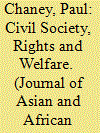

|
|
|
|
|
| Summary/Abstract |
This study examines Cambodia’s implementation of the United Nations Convention on the Rights of the Child (CRC). Corpus analysis of civil society organisations’ submissions to the United Nations Universal Periodic Review reveals a raft of CRC violations, including sexual abuse, trafficking and child labour. This is due to political and bureaucratic failings. The wider significance of this lies in underlining how the disjuncture between state and civil society underpins ongoing violations. Future progress depends on strengthened mobilisation yet increasing repression of civil society makes this unlikely. Accordingly, the prospects are bleak with children in Cambodia continuing to suffer widespread rights violations.
|
|
|
|
|
|
|
|
|
|
|
|
|
|
|
|
| 4 |
ID:
188947
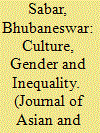

|
|
|
|
|
| Summary/Abstract |
This ethnographic paper explores gender inequality in tribal societies vis-à-vis customary practices and challenges the notion of egalitarianism of tribal society by taking Chuktia Bhunjia tribe of Odisha, India as an analytical category. In the light of a discussion on women specific taboos and restrictions, captured through formal interview, narrative and lived experience approach, the paper explicates the deeply embedded nature of the taboos in Chuktia Bhunjia society and unravels how prohibiting women from socio-economic and religious space, backed by purity-pollution philosophy, perpetuate the gender inequality among them. It was found that although economic division of labour is indistinct; women are perceived being portrayal of misfortunes during perceived pollution periods and are prohibited to enter into sacred places – kitchen room, cowshed, sacred groves and forest – and take part in community festivals and other auspicious occasions. The existing material culture, especially kitchen room, alongside economic structure, self-notion of ‘outsiders’ and apparently fixed customary laws have direct influence on the position of women in this society. It is found that the customary laws are not mere symbolic expressions in perpetuating the gender asymmetry, but have become a powerful tool to patriarchal controls not only over women’s education, health, properties and knowledge, but also over individual’s choice, freedom, decision-making and sexuality. However, internal challenges are reported against customary laws and taboos, the fear of social ostracism, the obligation to restore the purity of cultural entity and anxiety reinforce people to be always submissive to those practices. Therefore, unless there is transformation alongside their culture, it is fruitless to think of gender equality.
|
|
|
|
|
|
|
|
|
|
|
|
|
|
|
|
| 5 |
ID:
188942
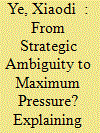

|
|
|
|
|
| Summary/Abstract |
How do changes in US Taiwan policy play out? What is the logic behind these changes? To address these questions, existing studies have formulated four schools of explanation, providing valuable theoretical insights. However, these studies have obvious problems with unidirectional dichotomy and thus fail to identify a causal mechanism explaining the long-term trajectory of US Taiwan policy. This article conducts a re-typology of US Taiwan policy to break the traditional strategic ambiguity–clarity dichotomy by establishing three key indicators and argues that the orientation of US China policy and Taiwan’s US policy are the two major factors triggering changes. By conceptualizing and operationalizing the two independent variables as engagement-oriented, coopetition-oriented, containment-oriented, and hedging/bandwagoning/binding, this article develops a systemic theoretical framework to demonstrate how the US Taiwan policy transits between strategic clarity, maximum pressure, partial strategic clarity, between partial strategic clarity and strategic ambiguity, strategic ambiguity, and controlling the pro-independent forces. This article conducts empirical studies by reviewing the transition of US Taiwan policy under different presidencies in post–Cold War era to demonstrate how the theoretical framework works in realpolitik.
|
|
|
|
|
|
|
|
|
|
|
|
|
|
|
|
| 6 |
ID:
188948


|
|
|
|
|
| Summary/Abstract |
Based on unpublished documents from the recently declassified archives of the Italian Foreign Ministry, this article aims to provide an in-depth analysis of the facts that transpired during the presidency of Ahmed Ben Bella (1962–1965) in Algeria, from the Italian point of view. From the story and the point of view of Italian diplomatic representations in North Africa, three critical moments for the young independent state in the 3 years following the ceasefire of 19 March 1962 are analysed: the crisis of the summer of 1962, the Sands War of October 1963 and the coup d’état of Boumedienne of 19 June 1965. This article argues that Italian diplomats in Algeria were all intent on their mission, seeking with their analyses to understand when a certain stability in the country could be glimpsed, such as to allow the government of Rome to launch important investments and lasting technical and commercial collaboration agreements.
|
|
|
|
|
|
|
|
|
|
|
|
|
|
|
|
| 7 |
ID:
188945
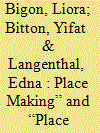

|
|
|
|
|
| Summary/Abstract |
This article expands on the usability of the concepts of “place making” and “place attachment” as recently developed in urban studies research in the context of housing insecurity of marginalized communities in today’s neo-liberal city. Particularly, against the growing threat of urban evictions, the article utilizes a transdisciplinary approach, showing the relevance of both concepts for (a) a better understanding of bottom-up processes of spatial production and attempts to create a sense of place on the part of such communities, and (b) offering an innovative legal strategy for doing justice to these communities in terms of their compensation rights, especially where a title to land has not been registered on a private basis. These issues are critically examined on the site-related case of the Givat-Amal quarter in Tel Aviv, Israel. This district is now under actual final threat of forced evictions following seven conflicted decades with the state, municipal authorities and private entrepreneurs. Our transdisciplinary study is based on qualitative methodologies in human geography such as fieldwork, visual evidence, and interviews, with a glimpse into philosophy. It is equally based on revisiting “traditional” legal property rights through the lens of post-liberal human rights analysis. The argument can apply to many situations of forced evictions across Africa, Latin America, and the West itself.
|
|
|
|
|
|
|
|
|
|
|
|
|
|
|
|
| 8 |
ID:
188941


|
|
|
|
|
| Summary/Abstract |
The socio-economic characterisation of resettled small-holder farmers under the Fast Track Land Reform Programme (FTLRP) in Zimbabwe has blind spots in relation to the emergent transformative social policy features such as ‘social cohesion’, ‘cooperation’, ‘protection’ and ‘accumulation’ which are equally important among land beneficiaries. Using the Sangwe farm, this article departs from the conventional use of the political economy, sustainable livelihoods, human rights-based and neo-patrimonial approaches to experiment with the transformative social policy approach. Using both quantitative and qualitative data in an exploratory research design, the article shows that viewed from the transformative social policy approach, the FTLRP was neither a resounding success nor a complete disaster. The programme actually produced mixed results. The article thus, recommends the use of in-depth, ideologically free and neutral approaches in its analysis so as to reveal its detailed outcomes. Additional studies in which existing land reform policies can be considered in the collective efforts of improving the transformative agenda of the FTLRP across the country are needed.
|
|
|
|
|
|
|
|
|
|
|
|
|
|
|
|
|
|
|
|
|